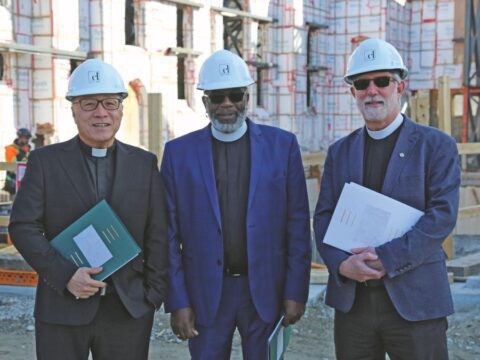Roy Collins was among the finest Christian gentlemen I’ve ever met — intensely devoted, funny, wise. During a study session at First United in Port Credit, Ont., back around the year 2000, we talked freely about the mythological imagery of the Bible, including the whole notion of God as myth.
Finally, Roy, in his mid-70s at the time, could no longer constrain himself. “Why have ministers lied to me all my life?” he blurted. “You ministers know this stuff; you’ve studied it in college and read all the books. Why haven’t the ministers of this church had the courage to go into the pulpit and share what you know with us dumb lay people?”
You may unsubscribe from any of our newsletters at any time.
Yikes.
I pondered that for a long time. I looked at my old sermons, prayers and liturgies.
Yes, I had used “God language,” assuming people understood that I was speaking the language of poetry. I had delved into scripture, implying (but rarely stating) that we were exploring a human text about a human journey. I had proclaimed the wonder of Jesus the Christ, affirming things I believed to be true, but rarely rejecting, with sufficient vigour, the smothering weight of theological nonsense with which the church had burdened Roy and others.
And I decided that, if what I’d been saying wasn’t clear to Roy, it likely wasn’t clear to anyone. It was time to set the record straight, and for the last decade I’ve been trying to do just that.
As a result of becoming more outspoken, I know some people worry that I’ve lost faith. But I don’t understand my journey in those terms; my faith feels more or less the same as ever. I can’t even say I’ve lost orthodoxy, because I’ve never subscribed to orthodox Christianity and never pretended to.
Let me be clear. There is no “Guy in the Sky.” There is no divine puppet master, shaping us out of clay, writing our script and pulling our strings. In fact, there is no “being” of any sort named God.
Copernicus actually lived. Galileo actually lived. Charles Darwin actually lived. Quantum physics is a reality. Evolution is an ongoing exercise in creation. We live in an expanding universe of unimaginable proportions, within which our planet is merely a speck. In such a time as this, the notion of a being named God who knows us by name, numbers the hairs on our heads and steers our destiny is no longer credible.
Understanding what it might still mean to use the word “God” is the central task of faithful people today. But before we can move on to
fresh wine, we have to discard old skins. And any notion of a god with a “skin” or substance of any kind — physical, spiritual, metaphysical, whatever — must go.
Once the idea of God as “being” is dispensed with, other things get easier. We can think about living a Christ-like sacrificial lifestyle without falling into the barbaric notion of a vengeful father who “required” the bloody death of his son on our behalf.
We can delve into the wonders of scripture without fear that we are messing with the word of God.
We can engage in dialogue with people of other faiths without comparing our “God” to theirs.
We can actually go into a church without checking our brains at the door.
During my last decade of ministry, I served two congregations, First United and Lawrence Park Community Church in Toronto, where there was hunger for truth. Good, faithful people kept telling me how liberating it was to “say what we know to be true,” without feeling inadequate or ostracized.
Together, we struggled to find new language for prayer, new ways to understand justice, new pathways to authentic living, all in a post-theistic context — that is, a world without a being named God. Some of the flock left, heading for safer, more orthodox pastures; we wished them well. But those who stayed never again felt the need for the ecclesiastical “nudge and wink” while reciting creeds we knew to be false and proclaiming beliefs we knew to be nonsense.
The reaction in the larger church has been predictably less enthusiastic. Following one of my expostulations in The Observer, a former member of my congregation wrote the editor to explain that people with faith like mine should leave. Others who explore post-theistic Christianity have heard similar opinions many times.
Last year, I did finally leave the United Church. I withdrew, voluntarily, from the order of ministry; I am no longer “Reverend” and no longer a member of The United Church of Canada. However, it wasn’t angry voices that drove me out — it was thunderous denominational silence on the theological question of our time: What, if anything, does it mean to use the word “God”?
Across the denomination, people of faith are starving to have intelligent theological conversations. But when I attend worship these days, I hear empty platitudes about how “God loves you” and “Christ is alive” — without any serious effort to plumb what those phrases might actually mean.
Terrified lest it lose more members, a dying denomination has little energy left for exploring what it means to live in a world where God, as we have known “Him,” is no longer credible. There are too many leaking roofs and busted boilers.
So, like many others, I lost my church. But lost my faith? Not so much.
I live in the country now, surrounded by wonder. I wake each morning to the singing of birds, and no one to tell me I am a sinner in need of redemption. I seek for eternal truth, with no one to insist I recite a Trinitarian formula. I look for ways to understand justice and ethics, without feeling constrained by Ten Commandments. And, in my head, I sing old hymns with great gusto, not worrying one whit about what they literally mean.
Through 40-plus years of ministry, I always preached that faith had nothing to do with preparing for another life — and everything to do with living this life with purpose, dignity and joy. Right now, my life feels purposeful, dignified and joyful. How can I say I’ve lost my faith?
Ken Gallinger is a writer in Nobel, Ont.
***
This story first appeared in The United Church Observer’s November 2013 issue with the title “Don’t call me Rev. anymore.”














